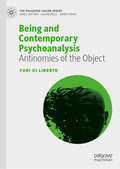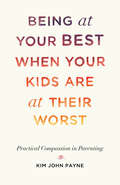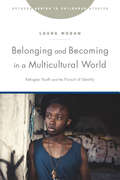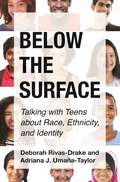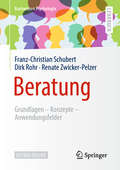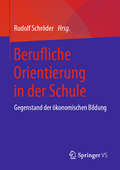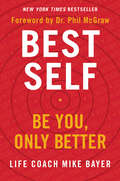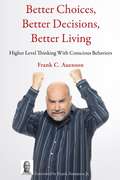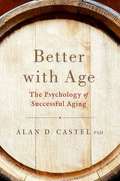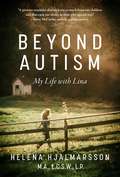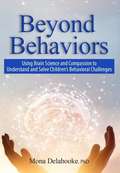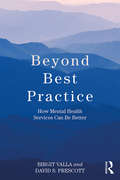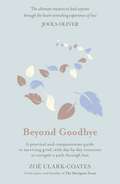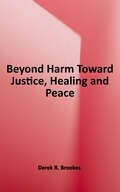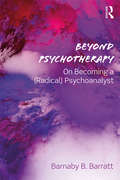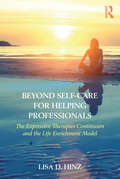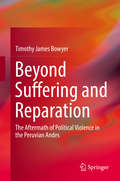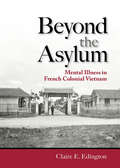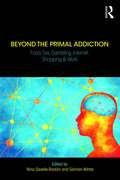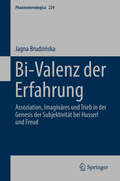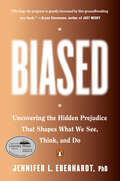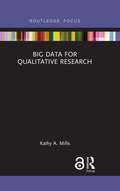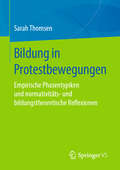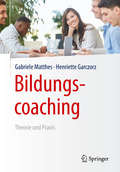- Table View
- List View
Being and Contemporary Psychoanalysis: Antinomies of the Object (The Palgrave Lacan Series)
by Yuri Di LibertoThis book explores how philosophical realisms relate to psychoanalytical conceptions of the Real, and in turn how the Lacanian framework challenges basic philosophical notions of object and reality. The author examines how contemporary psychoanalysis might respond to the question of ontology by taking advantage of the recent revitalization of realism in its speculative form. While the philosophical side of the debate makes a plea for an independent ontological consistency of the Real, this book proposes a Lacanian reassessment of the definition of the Real as ‘what is foreign to subjectivity itself’. In doing so, it reframes the question of the Real in terms of what is already there beneath the supposedly linguistic constitution of subjectivity. The book then goes on to engage the problem of cognition in the realm of Nature qua materiality, focusing on the centrality of the body as a linguistic-material hybrid. It argues that it is possible to re-establish the theoretical dignity of Ricoeur’s notion of ‘suspicion’, by building a dialogue between Lacanian psychoanalysis and three main domains of inquiry: desire, objects and bodily enjoyment. Borrowing from Piera Aulagnier’s theory of the Other as a word-bearer, it considers the genesis of desire and sense of reality both explainable through a hybrid framework which comprises psychoanalytical insights and material dynamics in a comprehensive account. This created theoretical space is an opportunity for both philosophers and psychoanalysts to rethink key Lacanian insights in light of the problem of the Real.
Being at Your Best When Your Kids Are at Their Worst: Practical Compassion in Parenting
by Kim John PayneA practical, meditative approach that can be used in the moment to help you stay calm and balanced when your child's behavior is pushing you to your limit--by the popular author of Simplicity Parenting.When children are at their most difficult and challenging situations arise, how can we react in a way that reflects our family values and expectations? Often, when children “push our buttons,” we find ourselves reacting in ways that are far from our principles, often further inflaming a situation. When our children are at their worst, they need us to be at our best—or as close to it as we can be. Educator and family counselor Kim John Payne, author of Simplicity Parenting, offers techniques that simply and directly shift these damaging patterns in communication and parental behavior. These grounded and practical strategies will help you: • Slow down the interaction • Be more in control of your reactions • Open up a much wider range of helpful responses • Sense what your child’s deeper needs are even though they are misbehaving • Respond in a way that gives your child a feeling of being heard and still puts a boundary in place Payne’s meditative approach can be done anywhere, anytime; it lifts you out of old, unwanted patterns of action-reaction and prepares you so that the voice you speak with is closer to the parent you want to be. His concrete and simple techniques can help you, and your children, be at your best, even in the most challenging of times.
Belonging and Becoming in a Multicultural World: Refugee Youth And The Pursuit Of Identity (Rutgers Series In Childhood Studies)
by Laura MoranChildren and youth are front and center in the context of global mass migration and the social discord around questions of multicultural inclusion that it often ignites. It is young people at the forefront of navigating the complexities of cultural and ethnic diversity in their everyday lives. Imprecise portrayals of their inclination to either embrace diversity or to incite racism are used to exemplify both the success and failures of the multicultural project. In the context of young people's heightened politicization, Belonging and Becoming in a Multicultural World, shifts the focus to a group of Sudanese and Karen refugee youth's own insights, explanations and practices as they attempt to create a sense of identity and belonging. It sees these young people engaging race, racism and national identity in creative and unexpected ways as they are confronted with the social and moral implications of multiculturalism in Australia.
Below the Surface: Talking with Teens about Race, Ethnicity, and Identity
by Deborah Rivas-Drake Adriana Umaña-TaylorA guide to the latest research on how young people can develop positive ethnic-racial identities and strong interracial relationsToday’s young people are growing up in an increasingly ethnically and racially diverse society. How do we help them navigate this world productively, given some of the seemingly intractable conflicts we constantly hear about? In Below the Surface, Deborah Rivas-Drake and Adriana Umaña-Taylor explore the latest research in ethnic and racial identity and interracial relations among diverse youth in the United States. Drawing from multiple disciplines, including developmental psychology, social psychology, education, and sociology, the authors demonstrate that young people can have a strong ethnic-racial identity and still view other groups positively, and that in fact, possessing a solid ethnic-racial identity makes it possible to have a more genuine understanding of other groups.During adolescence, teens reexamine, redefine, and consolidate their ethnic-racial identities in the context of family, schools, peers, communities, and the media. The authors explore each of these areas and the ways that ideas of ethnicity and race are implicitly and explicitly taught. They provide convincing evidence that all young people—ethnic majority and minority alike—benefit from engaging in meaningful dialogues about race and ethnicity with caring adults in their lives, which help them build a better perspective about their identity and a foundation for engaging in positive relationships with those who are different from them.Timely and accessible, Below the Surface is an ideal resource for parents, teachers, educators, school administrators, clergy, and all who want to help young people navigate their growth and development successfully.
Beratung: Grundlagen – Konzepte – Anwendungsfelder (Basiswissen Psychologie)
by Franz-Christian Schubert Dirk Rohr Renate Zwicker-PelzerDieses Lehrbuch ist eine Einführung in die psychosoziale Beratung. Es vermittelt ein Verständnis von Beratung als einer Handlungsdisziplin, die sich nicht mehr als Subdisziplin verschiedener Fachgebiete versteht, sondern als ein eigenständiges, disziplinübergreifendes sowie wissenschaftlich fundiertes Denk- und Handlungskonzept. Dieses wird heute über spezifische Studiengänge an Hochschulen und Weiterbildungseinrichtungen vermittelt. – Als Lernende in diesen Einrichtungen erfahren Sie in dem Buch, wie sich Beratung vor dem Hintergrund etablierter Therapieschulen sowie lebensweltlicher und ressourcenorientierter Konzepte begründen kann.
Berufliche Orientierung in der Schule: Gegenstand der ökonomischen Bildung
by Rudolf SchröderIn dem Buch wird die schulische Berufsorientierung aus fachdidaktischer Perspektive der ökonomischen Bildung erörtert. Ziel ist es, die wissenschaftliche Diskussion zur Stellung der ökonomischen Bildung in der Berufsorientierung zu intensivieren und zugleich neue Forschungsperspektiven sowie und Gestaltungsperspektiven für die Lehrerbildung und die Schulpraxis zu entwickeln.
Best Self: Be You, Only Better
by Mike BayerForeword by Dr. Phil McGrawAsk yourself…are you truly who you want to be? Is this the life you really want? Are you living each day as your best self? What can you change, today?How would you answer those questions? Think about your daily life. Are you thriving, or going through the motions? Are your days full of work, relationships and activities that are true to your authentic self, or do you feel trapped on a treadmill of responsibility? If you dream of a better life, now is the time to turn your dream into reality. And the tools you need are within your grasp, to design a life that is fulfilling on the deepest levels. Best Self will show you how.Mike Bayer, known to the thousands of clients whose lives he has changed as Coach Mike, has helped everyone from pop stars to business executives to people just like you discover the freedom to be their best selves. By asking them and leading them to ask themselves a series of important but tough questions—such as “What are your core values?” “Do you go to bed each day more knowledgeable than when you woke up?” and “Am I neglecting some aspect of my physical health out of fear or denial?”—he helps them see what their Best Selves and Anti-Selves really look like. As a mental health specialist, a personal development coach, and an all-around change agent, Mike has seen the amazing ways in which lives can improve with honesty and clarity. He understands our struggles intimately, because he’s faced—and overcome—his own. And he knows that change is possible. By working through each of the Seven SPHERES of life—Social, Personal, Health, Education, Relationships, Employment and Spiritual Development—Best Self is an accessible and interactive book that distills all of Coach Mike’s wisdom into a compact, focused guide that will ignite anyone’s desire for change. Chock full of revealing quizzes, and full of provocative questionnaires, Best Self will empower you to embrace your authenticity, acknowledge what is holding you back, and break through to live a passionate life to the fullest, forever.
Better Choices, Better Decisions, Better Living: Higher Level Thinking With Conscious Behaviors
by Frank C AuensonMistakes happen but you can't allow them to define you as a person. Understand you have more control over your choices and decisions than you originally believed. In this book is an opportunity to learn and understand what you have been missing all these years. You are not alone! I too have made some bad choices and poor decisions in my lifetime which could have ruined me but here I am, still standing. Th e cool thing is, I get to help you with your journey to understanding your higher-level thinking through conscious behaviors. Frank C. Auenson
Better with Age: The Psychology of Successful Aging
by Alan CastelAge is an important number, but it can also be deceiving. After 40, most people say they feel younger than their years, some lie about their age, and many attempt to hide the signs of growing old. <p><p> Better with Age addresses the many myths and paradoxes about the aging process. Although most people think of their later years in terms of decline, they can be one of the best times in life. This book presents the latest scientific research about the psychology of aging, coupled with insights from those who have succeeded in doing it well, such as Maya Angelou, Bob Newhart, Jared Diamond, John Glenn, and John Wooden. <p> We are all aging, and many people are concerned about what to expect with advancing years. Retirement, happiness, and brain health are some of the many topics covered in this book. Better with Age shows what we can do now, at any stage in life, to make sure we enjoy old age.
Beyond Autism: My Life with Lina
by Helena HjalmarssonA Passionate Memoir about Life with a Teenage Daughter with Severe Autism, Following the Progress of Acclaimed Book, Finding Lina. Like her passionate first book, Finding Lina, about her daughter with severe autism, Helena Hjalmarsson brings an intensity of purpose and love to her second memoir about Lina, Beyond Autism. Lina’s world is one of excruciating challenges. Helena’s world is the same, but with her own insights, indominable spirit, and amazing clarity she sheds light and hope for other parents, siblings and caretakers of children with autism, as well as the children with autism themselves. She unflinchingly examines “the paradoxical nature of autism, the never-ending mystery of who our children are and how they got here, in the middle of this unfathomable hurricane of leaky guts, inflammation, yeast, autoimmune disorders, seizures, sensory breakdown, loss of words, physical freedom, sleep, friends, normal life as we are used to refer to it.”Beyond Autism is one of an increasing number of “you are not alone” literary statements from parents of children with autism forwarded to the people whose lives, similarly, often blocks the view of the larger community. Beyond Autism is intended to be a meeting place, of sorts. A smile of recognition. A reason for a little dark joke amongst parents.What Helena recognizes is that whenever Lina is not in mayhem, she is in heaven. “In those times she seems so free of the burdens of a past and a future, so deeply present and accepting of the moment …Whenever she is not suffering, it seems to me that she is at that enlightened, awakened place that most people struggle for a whole life time to catch a glimpse of.” It’s that glimpse that Helene explores, and shares for all those who want, too, to catch and gain insight into the lives of those with autism and those who love them.
Beyond Behaviors: Using Brain Science and Compassion to Understand and Solve Children's Behavioral Challenges
by Mona Delahooke<p>In Beyond Behaviors, internationally known pediatric psychologist, Dr. Mona Delahooke describes behaviors as the tip of the iceberg, important signals that we should address by seeking to understand a child’s individual differences in the context of relational safety. <p>Featuring impactful worksheets and charts, this accessible book offers professionals, educators and parents tools and techniques to reduce behavioral challenges and promote psychological resilience and satisfying, secure relationships. </p>
Beyond Best Practice: How Mental Health Services Can Be Better
by Birgit Valla David S. PrescottWritten by practitioners for practitioners, this empirically-grounded book offers clinicians of all backgrounds a guide to incorporating feedback and self-development strategies that will dramatically enhance their therapeutic abilities. Building on the foundation of Feedback-Informed Treatment (FIT), Beyond Best Practice explores the benefits of practicing therapy using in-the-moment client feedback, with an emphasis on ongoing, typically solitary, deliberate practice. Chapters describe the real-world journey of an established master therapist and her agency, examining each element of FIT in detail through her eyes. Her journey is illustrated through discussions with prominent researchers, authors, former clients, as well as informative experiences outside of psychotherapy. Rich case examples of success, failure and "failing successfully" are also woven throughout, with a focus on the practical applications and skills needed to become an excellent and effective therapist and agency. What becomes clear through the many narratives is that we can improve our services by studying the obvious and subtle forms of feedback that are available to us at all times. Beyond Best Practice emphasizes what each practitioner can do to become more effective, one client at a time. It will be essential reading for all mental health practitioners and agencies working at the front lines of medical care.
Beyond Goodbye: A practical and compassionate guide to surviving grief, with day-by-day resources to navigate a path through loss
by Zoë Clark-CoatesBeyond Goodbye guides you through your darkest days of suffering and offers hope for your future...Grief can leave us feeling alone and lost in the world, not knowing where to turn for help. And yet grief is one of the few certainties in life - it is impossible to experience love without suffering loss.Leading grief expert Zoë Clark-Coates examines the different losses we may endure in our lives, and provides the much-needed support that helps you navigate your own path through loss.From losing loved ones - parents, partners, children, siblings, family members and friends - to answering the most common questions that are asked in this time of mourning and beyond, Zoe tackles topics that are rarely discussed but essential to address.Beyond Goodbye balances practical advice with personal stories and emotional support. It explores common myths around loss, and offers advice for those supporting the bereaved.Zoe's caring and compassionate guide includes a unique 60 day support plan to guide you on your way.Beyond Goodbye will be a beacon of hope to all who read it.
Beyond Goodbye: A practical and compassionate guide to surviving grief, with day-by-day resources to navigate a path through loss
by Zoë Clark-CoatesBeyond Goodbye guides you through your darkest days of suffering and offers hope for your future...Grief can leave us feeling alone and lost in the world, not knowing where to turn for help. And yet grief is one of the few certainties in life - it is impossible to experience love without suffering loss.Leading grief expert Zoë Clark-Coates examines the different losses we may endure in our lives, and provides the much-needed support that helps you navigate your own path through loss.From losing loved ones - parents, partners, children, siblings, family members and friends - to answering the most common questions that are asked in this time of mourning and beyond, Zoe tackles topics that are rarely discussed but essential to address.Beyond Goodbye balances practical advice with personal stories and emotional support. It explores common myths around loss, and offers advice for those supporting the bereaved.Zoe's caring and compassionate guide includes a unique 60 day support plan to guide you on your way.Beyond Goodbye will be a beacon of hope to all who read it.
Beyond Harm: Toward Justice, Healing and Peace
by Derek R. BrookesWe have all been hurt by someone, in some cases very seriously. And we have all inflicted pain on someone else, even if it was unintended. The consequences have often been devastating, and continue to this day. We find ourselves 'stuck' in anger, fear, isolation, disbelief, bitterness, self-blame, denial, guilt, shame . . . the list is all too familiar. Our friends and family plead with us to 'move on' and 'put the past behind us'. But it's never that simple. There is no 'magic wand' that can instantly sweep away this kind of pain. <p><p>So what can we do? How can we find some peace? Is it possible to heal from what has happened? Would some kind of punishment make a difference? Do we need to forgive? Would an apology help? How can we find a way out of this agonising hurt and negativity? Will it ever be possible to 'make things right'? 'Beyond Harm' explores all of these questions, and offers a way forward. The first Part looks at what it means to be wronged, why it hurts so much. It sets out an explanation for why we react to wrongdoing in the ways that we do, so many of which only cause us more suffering and pain. And it offers an alternative: a kind of 'justice' that can bring the healing and peace that we crave. This is a response that honours our moral values and acknowledges our common humanity. It is also evidence-based: it takes seriously how we actually think and feel about wrongdoing. The second Part draws on the first by exploring what it would take for this alternative to become a reality. It shows how it is possible to 'make things right' by using a tried and tested practice called 'restorative justice', and what is needed for this approach to be safe and effective.
Beyond Psychotherapy: On Becoming a (Radical) Psychoanalyst
by Barnaby B. BarrattIn Beyond Psychotherapy: On Becoming a (Radical) Psychoanalyst, Barnaby B. Barratt illuminates a new perspective on what it means to open our awareness to the depths of psychic life and restores the radicality of genuinely psychoanalytic discourse as the unique science of healing. Starting with an incisive critique of the ideological conformism of psychotherapy, Barratt defines the method of psychoanalysis against the conventional definition, which emphasizes the practice of arriving at useful interpretations about our personal existence. Instead, he shows how a negatively dialectical and deconstructive praxis successfully ‘attacks’ the self-enclosures of interpretation, allowing the speaking-listening subject to become existentially and spiritually open to hidden dimensions of our lived-experience. He also demonstrates how the erotic deathfulness of our being-in-the-world is the ultimate source of all the many resistances to genuinely psychoanalytic praxis, and the reason Freud’s discipline has so frequently been reduced to various models of psychotherapeutic treatment. Focusing on the free-associative dimension of psychoanalysis, Barratt both explores what psychoanalytic processes can achieve that psychotherapeutic ones cannot, and considers the sociopolitical implications of the radical psychoanalytic ‘take’ on the human condition. The book also offers a detailed and compassionate pointer for those wanting to train as psychoanalysts, guiding them away from what Barratt calls the ‘trade-school mentality’ pervading most training institutes today. Groundbreaking and inspiring, Beyond Psychotherapy will be essential reading for psychoanalysts, psychoanalytic psychotherapists and all other therapists seeking a radically innovative approach. It will also be a valuable text for scholars and students of psychoanalytic studies, social sciences, philosophy and the history of ideas.
Beyond Self-Care for Helping Professionals: The Expressive Therapies Continuum and the Life Enrichment Model
by Lisa D. HinzBeyond Self-Care for Helping Professionals is an innovative guide to professional self-care focused not just on avoiding the consequences of failing to take care of oneself, but on optimal health and positive psychology. This new volume builds upon the Expressive Therapies Continuum to introduce the Life Enrichment Model, a strengths-based model that encourages mindful participation in a broad array of enriching experiences. By enabling therapists and other Helping Professionals to develop a rich emotional, intellectual, and creative foundation to their lives and clinical practices, this guide sets a new standard for self-care in the helping professions.
Beyond Suffering and Reparation: The Aftermath of Political Violence in the Peruvian Andes
by Timothy James BowyerThis book presents the key issues, debates, concepts, approaches, and questions that together define the lives of rural people living in extreme poverty in the aftermath of political violence in a developing country context. Divided into nine chapters, the book addresses issues such as the complexities of human suffering, losing trust, psychic wounds, dealing with post-traumatic stress situations, and disillusionment after change. By building knowledge about human and social suffering in a post-conflict environment, the book counters the objectification of human and social suffering and the moral detachment with which it is associated. In addition, it presents practical ways to help make things better. It discusses new methodological concepts based around empathy and participation to show how the subjective reality of human and social suffering matter. Finally, the book maps a burgeoning field of enquiry based around the need for linking psychosocial approaches with the actual lived experience of individuals and groups.
Beyond the Asylum: Mental Illness in French Colonial Vietnam (Studies of the Weatherhead East Asian Institute, Columbia University)
by Claire E. EdingtonClaire Edington's fascinating look at psychiatric care in French colonial Vietnam challenges our notion of the colonial asylum as a closed setting, run by experts with unchallenged authority, from which patients rarely left. She shows instead a society in which Vietnamese communities and families actively participated in psychiatric decision-making in ways that strengthened the power of the colonial state, even as they also forced French experts to engage with local understandings of, and practices around, insanity. Beyond the Asylum reveals how psychiatrists, colonial authorities, and the Vietnamese public debated both what it meant to be abnormal, as well as normal enough to return to social life, throughout the early twentieth century. Straddling the fields of colonial history, Southeast Asian studies and the history of medicine, Beyond the Asylum shifts our perspective from the institution itself to its relationship with the world beyond its walls. This world included not only psychiatrists and their patients, but also prosecutors and parents, neighbors and spirit mediums, as well as the police and local press. How each group interacted with the mentally ill, with each other, and sometimes in opposition to each other, helped decide the fate of those both in and outside the colonial asylum.
Beyond the Primal Addiction: Food, Sex, Gambling, Internet, Shopping, and Work
by Salman Akhtar Nina Savelle-RocklinWritten by experienced practitioners in the fields of addiction and psychoanalysis, and illustrated by a range of moving vignettes, this groundbreaking book examines the psychological foundations of addiction in the areas of food, sex, gambling, internet usage, shopping, and work. This book not only explores the roots of addictive behavior, explaining why popular treatment options such as the 12-Step Program often fail, it also provides insights for emotional resolution and strategies for behavioral change. Beyond the Primal Addiction seeks to understand rather than pathologize addictive behaviours, now so pervasive in contemporary societies. It will be essential reading for psychoanalysts, psychotherapists, and other mental health professionals, as well as their clients.
Bi-Valenz der Erfahrung: Assoziation, Imaginäres und Trieb in der Genesis der Subjektivität bei Husserl und Freud (Phaenomenologica #229)
by Jagna BrudzińskaEdmund Husserls Phänomenologie und Sigmund Freuds Psychoanalyse sind zwei große Denktraditionen des 20. Jahrhunderts. Erstmals wird in diesem Buch die lebendige problemgebundene Beziehung zwischen beiden untersucht, und zwar ausgehend von Husserls genetischer Phänomenologie. Im Fokus stehen drei große Erfahrungsbereiche des Menschen: die Assoziation, die Phantasie und der Trieb. Wie sich zeigt, spielen alle drei eine Schlüsselrolle, sowohl für Husserls als auch für Freuds Denken.Die Autorin hat für ihre Studie veröffentlichte wie auch unveröffentlichte Texte aus dem Werk Husserls berücksichtigt und die Ergebnisse lassen die Phänomenologie in einem neuen Licht erscheinen. So rücken in diesem Buch, anders als im allgemein-philosophischen Verständnis von Intentionalität, spezifische Formen der phantasmatischen und imaginären Intentionalität in den Vordergrund. Auf diese Weise betrachtet, zeigt sich die subjektive Erfahrung als eine menschliche Entwicklungsstruktur, die unter einer doppelten Ordnung steht: Wir und unsere Welt sind nicht nur durch Wahrnehmung strukturiert, sondern auch durch imaginäre Leistungen, durch triebhafte Tendenzen und unbewusste Wünsche. Die Autorin findet dafür den Begriff der Bi-Valenz, der Zweiwertigkeit der personalen Realität.Mit dieser Untersuchung werden zwei Ziele erreicht. Einerseits befreit die Autorin das Trieb-Verständnis der Psychoanalyse von seinem naturalistischen Rest, andererseits eröffnet sie für die Phänomenologie einen neuen Bereich anschaulicher Erfahrung: das dynamische Unbewusste. Das Medium dieser Erfahrung ist eine starke, produktive Phantasie, die aus triebhaften Quellen schöpft und unsere Realität mit-gestaltet. Der Band richtet sich an Studierende und Wissenschaftler, die sich für genetische Phänomenologie und die Philosophie der Psychoanalyse interessieren.
Biased: Uncovering the Hidden Prejudice That Shapes What We See, Think, and Do
by Jennifer L. Eberhardt"Groundbreaking."--Bryan Stevenson, New York Times bestselling author of Just MercyFrom one of the world's leading experts on unconscious racial bias, a personal examination of one of the central controversies and culturally powerful issues of our time, and its influence on contemporary race relations and criminal justice.You don't have to be racist to be biased. Unconscious bias can be at work without our realizing it, and even when we genuinely wish to treat all people equally, ingrained stereotypes can infect our visual perception, attention, memory, and behavior. This has an impact on education, employment, housing, and criminal justice. In Biased, with a perspective that is at once scientific, investigative, and informed by personal experience, Jennifer Eberhardt offers us insights into the dilemma and a path forward.Eberhardt works extensively as a consultant to law enforcement and as a psychologist at the forefront of this new field. Her research takes place in courtrooms and boardrooms, in prisons, on the street, and in classrooms and coffee shops. She shows us the subtle--and sometimes dramatic--daily repercussions of implicit bias in how teachers grade students, or managers deal with customers. It has an enormous impact on the conduct of criminal justice, from the rapid decisions police officers have to make to sentencing practices in court. Eberhardt's work and her book are both influenced by her own life, and the personal stories she shares emphasize the need for change. She has helped companies that include Airbnb and Nextdoor address bias in their business practices and has led anti-bias initiatives for police departments across the country. Here, she offers practical suggestions for reform and new practices that are useful for organizations as well as individuals. Unblinking about the tragic consequences of prejudice, Eberhardt addresses how racial bias is not the fault of nor restricted to a few "bad apples" but is present at all levels of society in media, education, and business. The good news is that we are not hopelessly doomed by our innate prejudices. In Biased, Eberhardt reminds us that racial bias is a human problem--one all people can play a role in solving.
Big Data for Qualitative Research
by Kathy A. MillsBig Data for Qualitative Research covers everything small data researchers need to know about big data, from the potentials of big data analytics to its methodological and ethical challenges. The data that we generate in everyday life is now digitally mediated, stored, and analyzed by web sites, companies, institutions, and governments. Big data is large volume, rapidly generated, digitally encoded information that is often related to other networked data, and can provide valuable evidence for study of phenomena. This book explores the potentials of qualitative methods and analysis for big data, including text mining, sentiment analysis, information and data visualization, netnography, follow-the-thing methods, mobile research methods, multimodal analysis, and rhythmanalysis. It debates new concerns about ethics, privacy, and dataveillance for big data qualitative researchers. This book is essential reading for those who do qualitative and mixed methods research, and are curious, excited, or even skeptical about big data and what it means for future research. Now is the time for researchers to understand, debate, and envisage the new possibilities and challenges of the rapidly developing and dynamic field of big data from the vantage point of the qualitative researcher.
Bildung in Protestbewegungen: Empirische Phasentypiken und normativitäts- und bildungstheoretische Reflexionen
by Sarah ThomsenDie Studie untersucht Soziale Bewegungen aus erziehungswissenschaftlicher Perspektive und fragt nach biographischen Bildungsprozessen von Akteuren sozialer Protestbewegungen. Mittels der Dokumentarischen Methode rekonstruiert die Autorin Phasen in sieben Bildungsbiographien, die im Kontext soziale Bewegungen angesiedelt sind und zeigt verschiedene Ausgestaltungen des transformativen Bildungsbegriffs auf.
Bildungscoaching: Theorie und Praxis
by Gabriele Matthes Henriette GarczorzMit Bildungscoaching tritt seit einigen Jahren ein neues Coachingformat auf. Der Nutzen wird von Bildungsorganisationen und Teilnehmern an Bildungsprozessen zunehmend wahrgenommen. Die Vielfalt der Angebote wächst beständig. Es gibt verschiedene Ansätze zur Professionalisierung, indes keine verbindlichen Standards oder Evaluationsinstrumente. Anhand von wissenschaftlichen Hintergrundrecherchen, Fallbeispielen und Konzepten aus der Praxis sowie einer Befragung von Bildungscoaches bietet das Buch interessierten Lesern einen Überblick und eine Orientierungshilfe über die weite Landschaft des Bildungscoachings.
